(If this message does not format properly in your email - please click the “Read in App / View in Browser” above, top right).
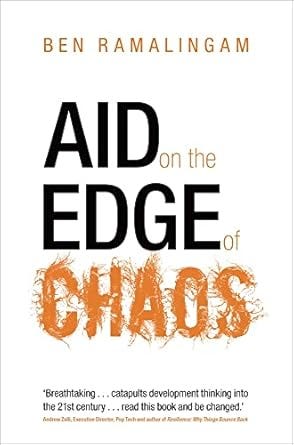
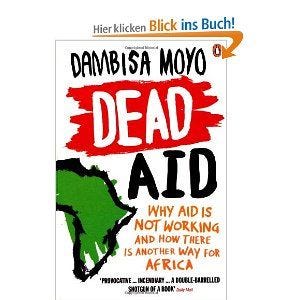
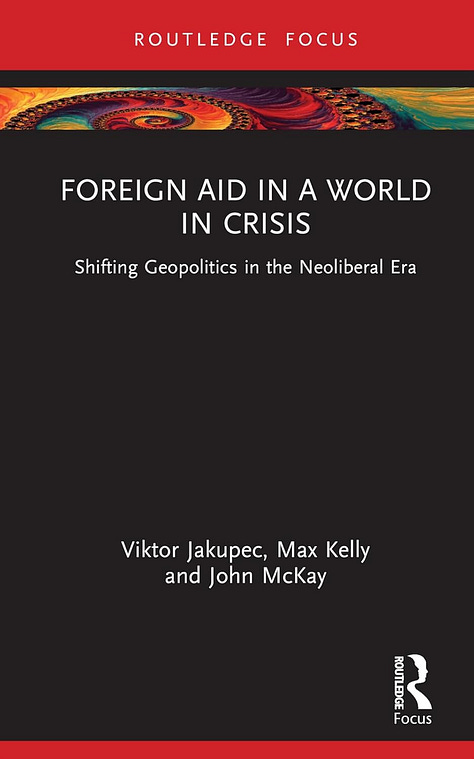
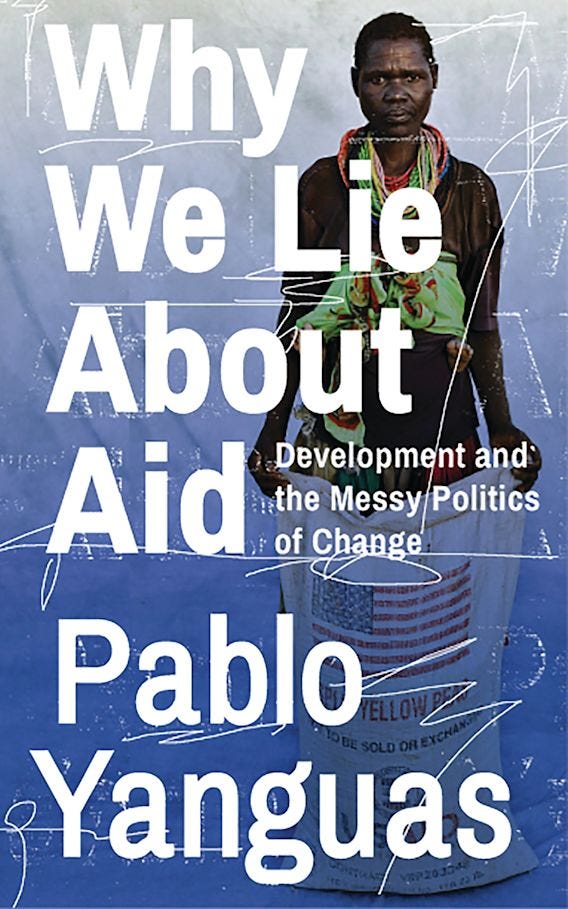
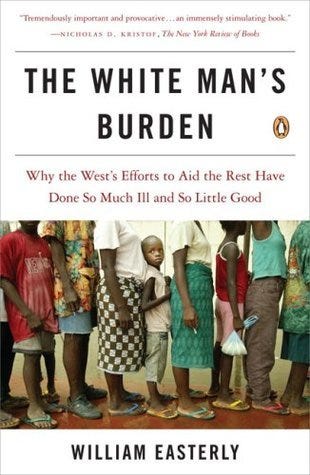
Introduction
If you work on donor funded development projects in the global south, you would be a rare and unreflective individual if you had not, at some point, questioned the way in which the current aid system works.
Whether that is questioning the imbalance in north-south power relationships, the misaligned agendas of donors and recipients, or the waste and inefficiency in many well-intentioned projects…..who has not asked : is this the best we can do ?
This month’s feature examines why many people think the current aid system is broken, perhaps beyond repair, and whether a new kid on the block – Global Public Investment (GPI) - offers a pathway to a better future ?
Andy Brock, September 2024
Subscribe for free and receive each issue of Re Education automatically to your inbox.
“Experience is the hardest kind of teacher. It gives you the test first and the lesson afterwards”. Oscar Wilde
Broken Aid
“Dead Aid : Why Aid Is Not Working and How There Is a Better Way for Africa” Dambisa Moyo“
“Aid on the Edge of Chaos” Ben Ramalingam
“The White Man’s Burden” William Easterly
“Foreign Aid in a World in Crisis”, Victor Jakupec
“Why we Lie about Aid” Pablo Yanguas
The titles of these well-known books on international aid all evince a belief that the aid system as we know it is broken. They point to a crisis of confidence in the model that has evolved since the end of the second world war : a model predicated on a rich north “helping” a poor south.
The “help” changed over time – from a cold war version which had as much to do with geopolitical rivalries between the USA and USSR as it did with assisting developing economies, to one, from the 1970s/80s onwards, dominated by the agendas of multilateral institutions such as the World Bank, Asian Development Bank and European Union. The 1990s saw the rise of prominence of bilateral donors like the US and the UK which, as the 2008 financial crisis hit budgets, was followed by the increasing prominence of philantho-capitalists, principal among them the Gates Foundation (largely in the health sector).
The dominant players shifted and changed in this time – and thus, so did their agendas - from infrastructure heavy support in the 1970s, to human capital formation in the 1990s / 2000s (vid. the Millenium Development Goals, MDGs), to “market” development in the early 2000s / 2010s and, finally, the Sustainable Development Goals (SDGs). But, though agendas may have altered, the basic model of a rich north providing loans or grants (or increasingly sophisticated financial instruments), has not changed. That this support has largely been presented as altruistic, has barely hidden the real self-interest involved – whether as banks lending money, or governments using aid as a soft power component of their diplomacy.
Criticisms of this system have been long in gestation. China’s rise as a superpower with a more blatant use of unconditional or low-condition loans as an instrument of diplomacy and trade (akin to the old aid-for-trade model), coupled with a political populism in the west that focuses on the self-interest of national governments in giving aid, has only served to accentuate the nature of the power imbalances in the relationships between donors and recipients. In democratic countries these trends have also been fuelled by a lack of support from electorates for aid when they themselves are feeling the pinch. The unequal distribution of vaccines during the COVID pandemic, registering barely a murmur of protest in the north, underscores the point.
The Need is still there
But, while critiques of conventional aid are easy to come by, solutions are harder. Decolonisation and localisation, both dominant in current discourse, emphasise the need for power over decision-making to be located in the countries receiving support. Decolonisation goes further to critique the very nature of the “help” being given, it’s framing, the people providing support, the assumptions about the nature and purpose of that support.
But, neither critique seriously challenges the idea that funds / support should flow from rich to poor, from north to south. And that is because there is no real disputing the need that exists. By most metrics Africa and South Asia lag their northern counterparts. For example, while 7/10 of the worlds’ 10 year olds cannot read a simple sentence, that figure is nearly 9/10 in Sub-Saharan Africa, but only around 1/10 for Europe and Central Asia. Similarly, how can the digital inequalities between Africa and the north be addressed when Africa has more internet users than America, but only as much data-centre space as Switzerland (Economist 2021). In a world which is drawing back from globalisation and polarising rapidly the funds needed to address these huge inequalities in the south cannot be generated at country level alone by growth or taxes only.
The need in most countries is also not just for funding but also for support in the form of expertise, ideas, or experience of development of other systems. Those aspects of support are often, but not exclusively, from outside the country of need, whether regional or international. But, because such support is external it too can be tainted with the criticism of coloniality or charity when it is attached to, or under the control of, donors.
An Alternative Pathway – the Theory
Is Global Public Investment a possible solution, or a pathway to a solution, to this crisis of aid ?
Global Public Investment is a blueprint for changing the mechanism of aid from a donor-recipient model to a global-community-membership model. The idea is simple : each country pays into a central pool of funds relative to its financial strength (e.g. GDP) and each country benefits in terms of projects / financial support according to its needs. The decisions of how countries benefit – the rules – are made by all.
Simple in principle, complex – and certain to be imperfect - in practice. But, it does start to address the localisation / decolonisation / power imbalance criticisms of the current model. And it changes the culture of aid – to one of a global community sharing rather than one of paternalistic givers and humble supplicants. Moreover, it removes the word “aid” or “charity” completely from discourse. Language matters, and different language leads to different thinking – investment implies a mutual focus of lender and borrower on positive benefits whether financial or social. The closest actual working examples are the UN or the European Union : all countries who pay into the UN / EU benefit – but they do so disproportionately according to need and the decision-making is, at least a little, more inclusive.
One of the leading voices behind GPI – Jonathan Glennie – outlined the case for GPI in his 2020 book “The Future of Aid”. Many of the themes foreshadow the case made by the Global Public Investment Network (GPIN) in its 2023 publication “Time for Global Public Investment”. Principal among these is the idea of a fund that addresses investment in global public goods. The three pillars of GPI that underpin this idea are : All Contribute ; All Benefit ; All Decide.
The pandemic was a stark example of how investments and preparation in a global public good, health, has the potential to provide a global public benefit. Education is another global public good that can provide global benefits if a more coherent approach is taken ; for example, seeing the current Learning Crisis as akin to an education pandemic lowering human wellbeing and growth in the future.
An Alternative Pathway – the Objections
But, we are a long way from such a reality at present. How could it come about – and aren’t the headwinds all blowing in the opposite direction just now : increasing polarisation and deglobalisation ?
Firstly, GPI already exists as a network (GPIN) dedicated to pushing the ideas above to become a reality, nudge by nudge, leap by leap. The network has gathered an impressive array of thinkers and doers with long experience of the current aid arrangements and weaknesses – and therefore the expertise on where to push and prod to try to make changes. Sensibly, they are not advocating for a “big bang” change but rather a series of incremental changes to current practices that will move in the direction of GPIN, creating confidence in bolder solutions over time.
However, the resistance is strong : increased polarisation between western countries and the China / Russia axis, and nationalist / protectionist political movements in many countries - often reactions to the painful changes caused by globalisation - have added to the sense of a narrow, internally focused, and self-interested politics.
Added to those objections is the vexed question of whether this wouldn’t simply lead to a large, unwieldy and politically compromised administrative system ? Attempts to reform the self-serving bureaucracies of the UN and EU do not give confidence. Critics, such as Stephan Klingebiel, accuse GPIN of being overly negative about the chances of reforming the current system and unrealistic about the level of vested interests and practical difficulties ranged against change. With such a backdrop, arguments for global responses to global challenges are not easy to make.
And yet, there are challenges where even nationalists conceded that a global approach must be taken. The challenge of climate change or pandemic preparedness for example, where country level approaches to global problems cannot work, is evident to many of all political persuasions. The crisis will only become more critical as extreme climate events or new health risks increasingly dominate our news and affect many at a personal level.
Finding pathways to address global climate change that involve all countries, even those in dispute with each other, will become a necessity that could act as a roadmap for other sectors like health and education, even if, right now, the examples of such collaboration (see the mess of the international climate finance initiative) are largely negative.
Where does Education Fit ?
Climate change and health seem natural sectors where GPI could be a mechanism to reform the old aid model – but what about education – which, curiously, is almost absent from GPIN narratives ? Is there a pathway to GPI in education ?
Firstly, basic education and early childhood education, are demonstrably global goods. There is a wealth of evidence that development of well-educated citizens is good for individuals and societies in a host of areas, ranging from private and social returns to fertility, peace and tolerance : those benefits are global in nature. Secondary and higher education can also lay claim to being public goods, though the private benefits to the individual are often greater.
There are already a plethora of international education organisations working to improve education in the global south from multilaterals such as UNICEF, UNESCO and GPE to special focus organisations like IFFED and the Education Outcomes Fund, in addition to bilateral donors and philanthropic foundations. A first step could be to try to harmonise and rationalise the strategic efforts of each of these agencies – first through strategic partnerships, even perhaps to the point of mergers, possibly starting at country level through existing education coordination mechanisms.
Bilateral agencies, especially if they acted together, could exercise pressure in this regard by funnelling their multilateral funding to the agency most likely to be able to transform into a GPI-friendly vehicle. If, at the same time, funding was contingent on ensuring the inclusion of more southern voices in institutional governance, that would be movement in the right direction. One possible incentive could be for cash-strapped northern governments to see greater impact for their small budgets and less direct criticism of their programmes, especially on the “all contribute / all benefit” principle. Another could be that national ministries of education in northern countries would also be eligible for some funding.
Where does this leave philanthropists, the private sector and non-country level actors – all increasingly active in the education space ? Firstly, not all money needs to flow through GPI ; the focus of GPI should be on those aspect of education that are incontrovertibly global goods, which in practice means early childhood and basic education. That leaves plenty of space for complementary or top-up programmes funded by the private sector / philanthropists.
In the post-secondary and higher education sectors there may be greater opportunities for programmes that blend government funds, philanthropy and the private sector. A stronger government led programme with better funding through GPI could also strengthen the hand of government to direct non-state actors to areas that benefit but do not compete with the state.
Secondly, there will always be a need for local level actors, NGOs, education charities. By having a clearer strategic direction for education, and how it is addressed as a global good through a proto-GPI mechanism, local actors can better prioritise where they can help most to add value.
Conclusion
If all of this feels a bit vague, that’s because it is. Ideas and movements like this do not usually appear as fully formed solutions. They appear first as a reaction to the inequities and inefficiencies of current systems and then gradually as solutions in a different shape.
For example, see the Bridgetown Initiative that Mia Mottley, Prime Minister of Barbados, proposed to address the climate crisis. There is considerable overlap with GPIN – though the scope is more narrowly drawn. Note too the shift that took place in 2015 from the narrowly framed Millennium Development Goals (SDG) to the broader Sustainable Development Goals (SDG) that apply to countries in the north as well as south, demonstrating how narratives can be nudged on to new, more global, paths.
As the Chinese saying goes, you have to “cross the river by feeling the stones”. Where GPIN seems to be on the right track is in creating a broad international coalition of advocates and in focusing on the importance of defining principles. That allows the exploration of different pathways to the same ultimate solution, and to judge all possible routes, even the scenic ones, by whether they are true to those principles.
Could tentative steps in this direction mark a new, better balanced and more respectful set of relationships where paternalism is replaced with partnership, charity with investment and dependency with independence ? Where all contribute and all benefit.
News
Over 20,000 children have been killed, detained or are missing in Gaza according to Al Jazeera. This is nothing less than the normalisation of scholasticide, as this op ed outlines ; and not only in Gaza but Ukraine too.
A recent article highlighted Kenya’s newest export : teachers. It’s hard to see the positives in this other than for the individuals concerned. For the education system as a whole, these will be some of the better teachers. Governments can’t stop individuals, but, should they be encouraging this “export” ?
The World Bank has launched its Global Education and Climate Report : “Choosing Our Future: Education for Climate Action”. the report and the recording of the launch presentation can be found here.
The Pakistan Foundational Learning Hub, established last year, has produced a “Pakistan Foundational Learning Landscape Analysis”. At 162 pages few will read the whole thing, but the Executive Summary is pithy and pointed. The most shocking statistic is that 40% of Pakistani children are stunted, a terrible indictment of successive government failures.
The World Bank is investing $415m in supporting and developing Ukraine’s education system, even while under conflict.
The 2025 UKFIET Education Conference has just been announced. Dates: 16-18 September. Theme: Mobilising knowledge, partnerships, and innovations for sustainable development through education and training. Details here.
Development
The stunning events in Bangladesh in August will have repercussions for the education system, even if that is not the highest priority of Chief Adviser, Professor Muhammed Yunnus’ caretaker government. An interesting Op Ed in The Daily Star by the authors of a new book on education and political economy in South Asia, maps out where the priorities may lie. One aspect, reflecting the forces that brought the government down, is a greater role of student union voice in education institution reform.
Voices from the front
The Girls’ Education South Sudan programme (GESS), has produced a series of reviews including this one on the impact of school capitation grants. The report shows clearly that the vast majority of schools spend capitation grants wisely to benefit children and learning. How much better could education development be if ministries entrusted schools with control of their own non-salary funds ? Aversion to misuse is always cited as the reason not to delegate funding - but, this is usually an excuse to maintain control and, perversely, leads to lack of accountability.
Voices from the rear
(Gray and Published Research)
A new report on emerging gender differences in socioemotional skills and traits (in Vietnam, India, Ethiopia and Peru) shows girls starting to fall behind in social-emotional competencies in adolescence. Poverty and gender attitudes are part of the story. The authors (M Hussain and M Jukes) suggest that Social and Emotional Learning (SEL) programmes can play a role in developing skills before gender differences emerge.
A recent study by Cambridge Education for the Global Child Protection Area of Responsibility (CP AoR) revealed that religious and traditional healers are often the first point of contact that a family goes to as a natural Mental Health and Psychosocial Support (MHPSS) coping strategy. Many religions offer teachings and practices that align with MHPSS principles. Full report here.
History Lessons
Spelling matters …
…and finally
Dan Bello a young gifted satirist from Nigeria is making a name for himself poking at some of the absurdities of Nigerian politics. Here he is on the respective value of Skills and Degrees. Enjoy !
Skills Vs Degrees in Nigeria (youtube.com)
If you know someone who would be interested in reading this newsletter, please pass on, by clicking the share button below. Subscription is free - subscribers receive each issue of Re Education automatically.




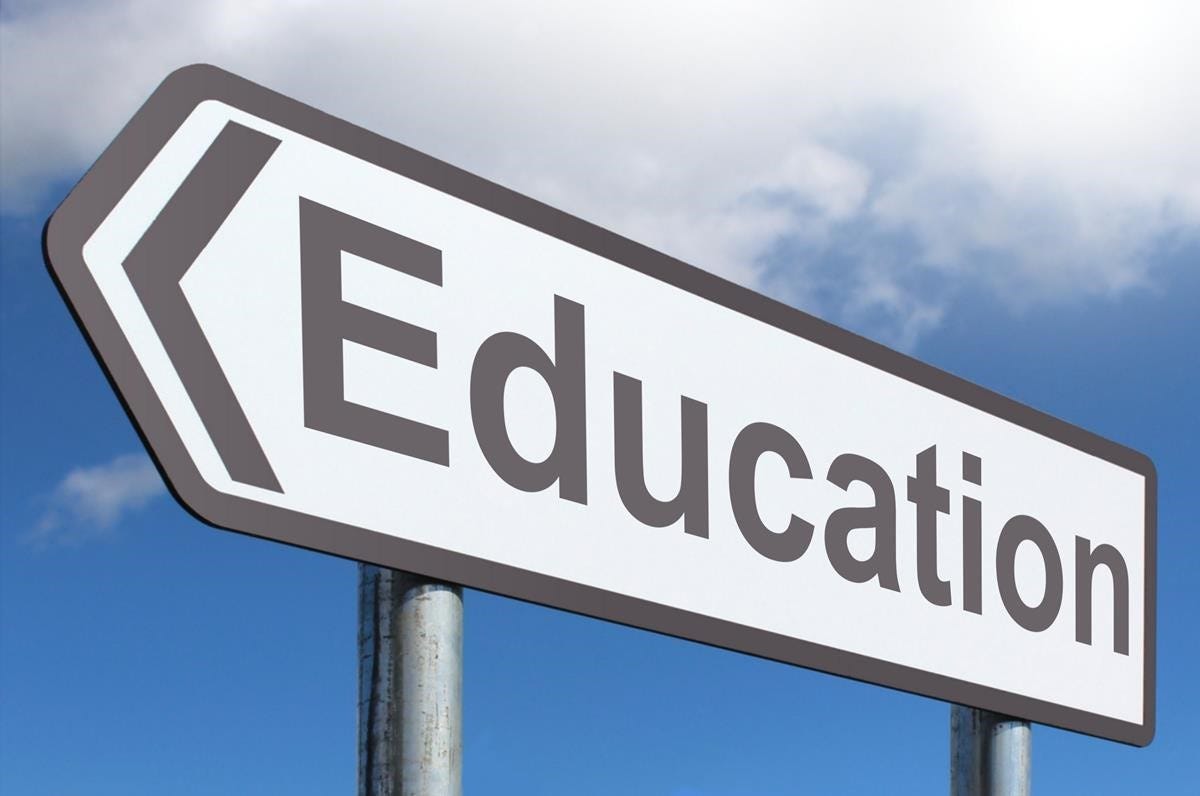

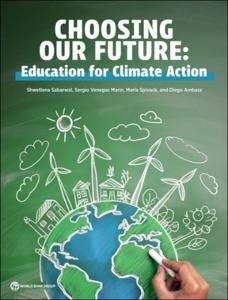


Very insightful analysis Andy. We definitely need a new approach to aid.